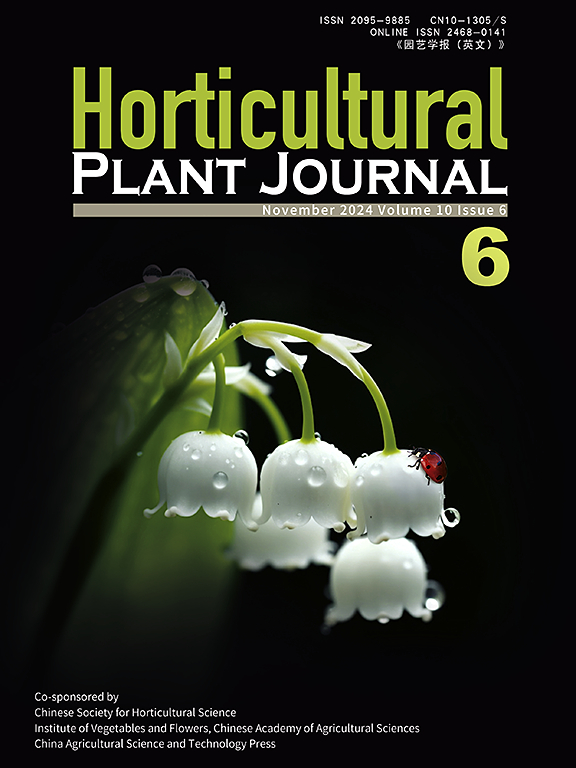纳米银预处理通过减少自由水的流动性延长剑兰切花采后的寿命
IF 5.7
1区 农林科学
Q1 HORTICULTURE
引用次数: 0
摘要
切花的含水量是影响其采后质量的一个重要因素。在本研究中,我们研究了纳米银粒子(NS)对切花剑兰寿命的影响,重点是水分状态和分布。我们利用低场核磁共振(LF-NMR)技术确定了三种具有不同横向弛豫时间(T2)值的水分组分:结合水 T21(10 毫秒)。在开放过程中,T23 在第 2 和第 3 阶段增加,然后减少,T22 缓慢减少,T21 保持不变。自由水值始终高于结合水和固定水,并在第 2 阶段达到最大值,直到第 4 阶段花瓣伸展并开始枯萎。质子密度加权磁共振成像(MRI)检测到,负责运输水分的维管束含水量较高。经 NS 预处理后,苞片中的结合水和自由水最初较低,但两天后,每种水状态的信号振幅都超过了对照组,这表明随着时间的推移,处理增强了持水能力。此外,NS预处理降低了切花自由水的流动性,抑制了茎的腐烂。此外,我们还利用扫描电子显微镜(SEM)和能量色散 X 射线光谱(EDS)技术发现,NS 可以进入茎干,并主要随水沿木质部向上运输。总之,我们的研究结果表明,NS预处理可减少剑兰切花中的游离水,提高其保水能力,延长其花瓶寿命。本文章由计算机程序翻译,如有差异,请以英文原文为准。
Pretreatment with nano-silver extends the post-harvest longevity of gladiolus cut flowers by reducing free water mobility
The water content of cut flowers is a significant factor in their post-harvest quality. In this study, we examine the efficacy of silver nanoparticles (NS) on the longevity of cut gladiolus, with a focus on water state and distribution. We used Low-field nuclear magnetic resonance (LF-NMR) technology to identify three water fractions with different transverse relaxation times (T2) values: bound water T21 (<10 ms), intermediate immobilized water T22 (10–100 ms), and the slowest component free water T23 (>10 ms). During the opening process, T23 increased at stages 2 and 3 and then decreased, T22 decreased slowly, and T21 remained unchanged. Free water values were consistently higher than bound water and immobilized water and reached their maximum from stage 2 until stage 4, when the petals were extended and began to wilt. The vascular bundles responsible for transporting water had higher water content, as detected by proton density-weighted magnetic resonance imaging (MRI). Bound water and free water with NS pretreatments in bracts were initially lower but then two days later the signal amplitude of each water state exceeded those of the control, indicating that the treatment enhanced the water-holding capacity over time. Furthermore, NS pretreatments reduced the free water mobility of the cut flowers and inhibited stem decay. Additionally, we found that NS can enter the stem and are primarily transported upward along the xylem with water using scanning electron microscopy (SEM) and energy-dispersive X-ray spectroscopy (EDS) technology. Overall, our findings indicate that NS pretreatment reduces free water in gladiolus cut flowers, enhancing their water retention and prolonging their vase life.
求助全文
通过发布文献求助,成功后即可免费获取论文全文。
去求助
来源期刊

Horticultural Plant Journal
Environmental Science-Ecology
CiteScore
9.60
自引率
14.00%
发文量
293
审稿时长
33 weeks
期刊介绍:
Horticultural Plant Journal (HPJ) is an OPEN ACCESS international journal. HPJ publishes research related to all horticultural plants, including fruits, vegetables, ornamental plants, tea plants, and medicinal plants, etc. The journal covers all aspects of horticultural crop sciences, including germplasm resources, genetics and breeding, tillage and cultivation, physiology and biochemistry, ecology, genomics, biotechnology, plant protection, postharvest processing, etc. Article types include Original research papers, Reviews, and Short communications.
 求助内容:
求助内容: 应助结果提醒方式:
应助结果提醒方式:


